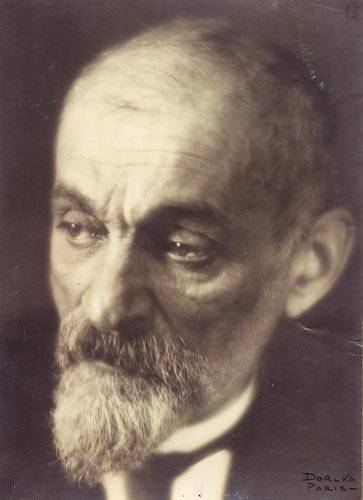
LEV SHESTOV (born Schwartzman) (13.02.1866, Kiev — 19.11.1938, Paris) — Russian philosopher of religious existentialism. He was born into the family of a rich Jewish manufacturer, and was educated at the Law School of Moscow University. His Ph.D. thesis on labour in Marx was suppressed by censorship. In 1895 he travelled to Europe. He married his wife Anna Berezovskaya in Rome the next year, and kept this marriage secret for a long time from his father. Shestov's first book Shakespeare and his critic Brandes was published in 1898. A number of articles and books on Russian writers Dostoevsky, Tolstoy, Chekhov, Sologub, were published during the following years. In 1905 was published his most influential book Apotheosis of Groundlessness, inspired by Kierkegaard and Nietzsche. He was expelled from the Soviet Union in 1920. With his family he settled in Paris, where he taught at the Sorbonne until his death, where he lectured on Plato, Luther, Pascal and Spinoza. Shestov taught philosophy to Bataille, who was also a translator of his book Philosophy and Predication. He was familiar with Heidegger, Levi-Strauss, Scheler, and he also entertained long-standing philosophical friendships with Husserl and Buber. It is thanks to Shestov that Husserl came to be known in France.
Shestov considered philosophy to begin at the extreme margins of life. To philosophize, for Shestov, means to overcome a impossibility of Being. Therefore the overcoming of death, eternity and the trivial round are one of his main themes. 'This would truly be the summit of human audacity, this would truly be a 'mutiny,' a 'revolt' of the single human personality against the eternal laws of the all-unity of being!' (Speculation and Apocalypse). Philosophy should strive against common categories, conventionalism of truth and rationalism of cognition; therefore he chose faith rather than knowledge.
The key philosophical theme of Athenes et Jerusalem is a strict confrontation between knowledge and belief, between Western rationalism and Eastern faith; the former he associates with captivity and narrowness, the latter is the source of freedom and diversity. Thus he creates his religious existentialism as a philosophy of multiplicity and emancipation from knowledge, morality and rules of mind and action. Philosophy should understand the world, but not to know it and not to investigate it by reason. He shared Heidegger's aim of the destruction of metaphysics and for his own part he undertook his own attempt to overcome metaphysics with the help of a faith. Faith, according to Shestov, is an ultimate emancipation of a human being from the limitation of the eternal laws, general rationalization and social dogmas. Shestov's Job 'knows that the general is deaf and dumb — and that it is impossible to speak with it' (Speculation and Apocalypse). To be means to believe, but not to think. Thus he took Luther's thesis as a title of his book Sola fide.
-=-
Shestov L., Shakespeare and His Critic Brandes. St. Petersburg, 1898, 1911;
Shestov L.. The Good in the Teaching of Tolstoy and Nietzsche. St. Petersburg, 1900, 1923;
Shestov L., Dostoevsky and Nietzsche: Philosophy of Tragedy. St. Petersburg, 1903, 1922; English: Ohio, 1969;
Shestov L., Apotheosis of Groundlessness. St. Petersburg, 1905, 1911; English: All Things are Possible, London, 1920, Ohio, 1979;
Shestov L., Beginnings and Endings. St. Petersburg, 1908; English: Penultimate Words and other Essays. Boston, 1916;
Shestov L., Great Vigils. St. Petersburg, 1910;
Shestov L., Porestas Clavium. Berlin, 1923; English: Potestas clavium, Ohio, 1968; Chicago, 1970;
Shestov L., In Job's Balances, London, 1932;
Shestov L., Kierkegaard et la philosophie existentielle (Vox clamantis in deserto). Paris, 1936; English: Kierkegaard and the Existential Philosophy. Ohio, 1969;
Shestov L., Athenes et Jerusalem: un essai de philosophie religieuse. Paris, 1938; English: Athens and Jerusalem. Ohio, 1966; N.Y., 1968; 1978;
Shestov L., La speculation et la revelation. Paris, 1964; English: Speculation and Revelation. Ohio, 1982;
Shestov L., Sola fide. Paris, 1957;
Shestov L., Turgenev. Ann Arbor, 1982;
Shestov L., Lectures on the History of Greek Philosophy. Moscow, 2001;
Great Twenty-Century Jewish Philosophers: Shestov, Rosenzweig, Buber. Ed. by Bernard Martin. N.Y.: MacMillan, 1969;
Fondale, B. Rencontres avec Leon Shestov. Paris: Plasma, 1982;
Struve, N. Leon Shestov: Une philosophie pas comm les autres? Paris: Institute d'etudes slaves, 1996;
-=-
© Dmitry A. Olshansky, M.A. in Philosophy (St. Petersburg)
E-mail: olshansky@hotmail.com
